Search Posts
Recent Posts
- New ALS treatment by PathMaker Neurosystems. Co. funded by RI Life Sciences Hub to come to RI. June 3, 2025
- ART! Cape Verdean Art at New Bedford Whaling Museum June 3, 2025
- Brown University Health names Samuel M. Mencoff Chair of the Board June 3, 2025
- Rhode Island Weather for June 3, 2025 – Jack Donnelly June 3, 2025
- Why 13-15 Rhode Island cities and towns oppose weapons ban legislation being voted on TODAY June 3, 2025
Categories
Subscribe!
Thanks for subscribing! Please check your email for further instructions.
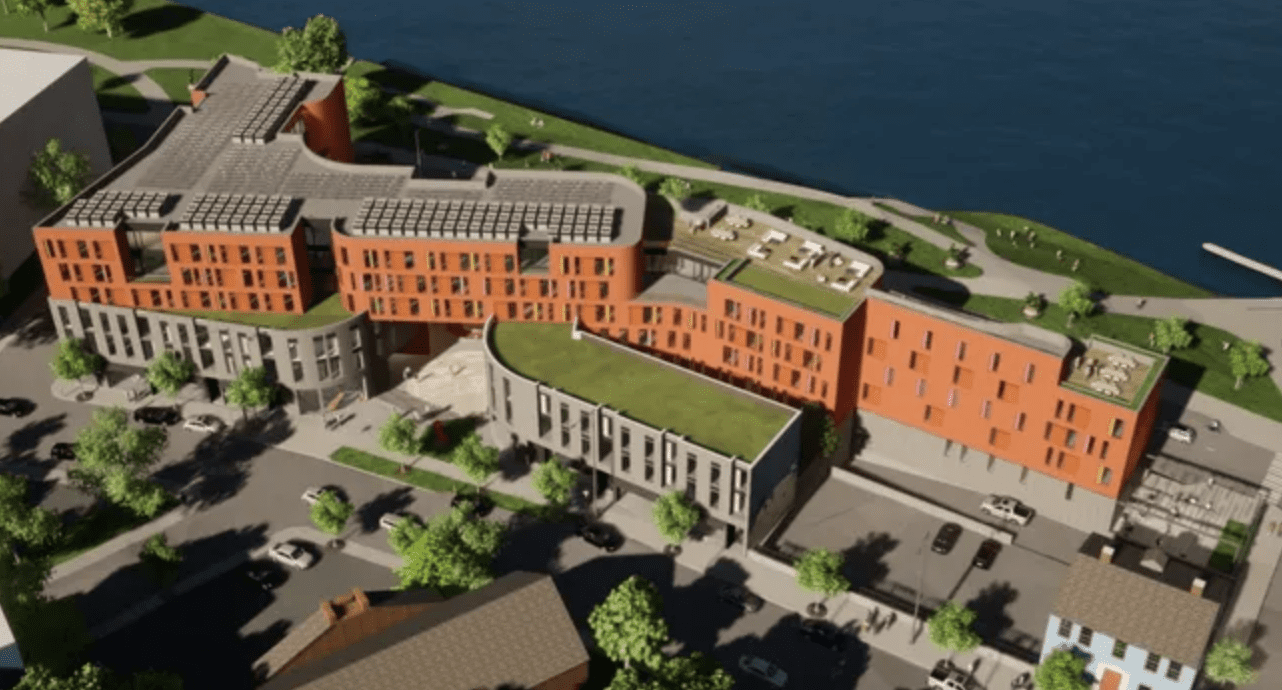
Updated: Save the Providence water view (NOT) – as city chooses tallest option for I-195 – David Brussat
by David Brussat, Architecture Here and There, contributing writer
Photo: City of Providence (emphasis added)
Editor’s Note: (2/4/2022) – The choice of the Providence commission is Urbanica, which is the tallest of the three options – more design intervention is planned for the future as the final designs get approved.
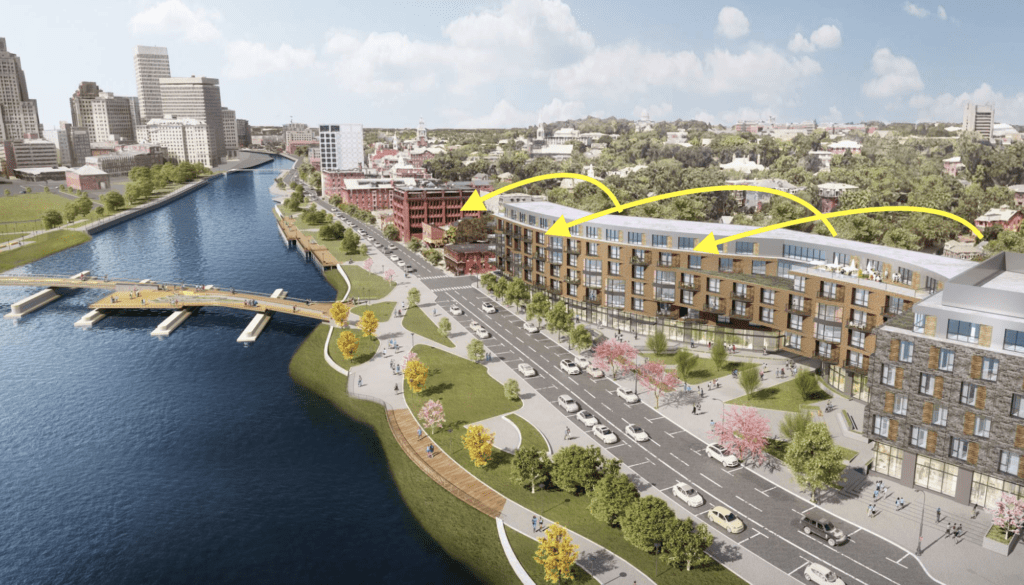
It may be too late to do anything for poor Tayo Heuser and Jeff Shore, according to Amy Russo’s story in the Providence Journal, “Neighbors scramble to soften impact of waterfront apartments.” They bought a “home” on Benefit Street seven years ago, and built a deck from which to enjoy their “picture-perfect view of the Providence River.” In a “twist of fate,” they they will probably soon be looking out, instead, at the rear end of a building filled with apartments.
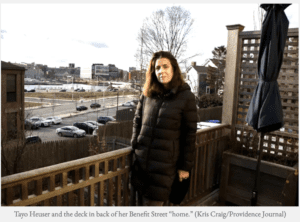
One of three proposals for that building will be chosen on Wednesday. The Parent and Diamond proposal sears the eye considerably less than the other two along its river frontage, but all three are arguably just as godawful from the rear, on South Main St., which faces the Heuser’s and Shore’s deck.
I suppose they’ll have to learn to take more satisfaction from the “fossils, artifacts and paintings” that fill their home, as Russo describes it. Or maybe they will have to better appreciate the rear of the Laborers’ International Union headquarters that already blocks the southerly portion of their view. It is encroaching from the left in the photo above by the Journal’s Kris Craig. To see the river, Heuser and Shore must angle their gaze to the northwest from their deck.
What dominates the view is the laborers’ parking lot on South Main Street. Yes, you can see the river, but you are also forced to see the buildings across the river for which the I-195 Redevelopment District Commission is responsible.
The predicament faced by Heuser and Shore brings into focus the reasons why their concerns should be front and center for the commissioners. The fine grain of architectural design should be uppermost in their design judgments. God may be in the details, but details are central to the commission’s understanding of what a community needs from developers and architects – an understanding the clearly eludes this commission, the specialists who appear before it, and most others in cities and towns across the nation.
The view at issue is a pathetic hodge-podge of quasi-modernist structures. This did not have to be. For years, I have urged the commission to promote, for this district, buildings that would reflect Providence’s historical character – that is, buildings erected on smaller parcels that would break up the size and footprint of buildings and foster design with traditional forms and materials that might better reflect (on the west side of the river) the Jewelry District’s historic architecture and (on the east side of the river) the areas of Benefit Street, College Hill and Fox Point that Heuser and Shore must have found alluring when they were looking for someplace to live.
The commission has seen fit to do none of this, and as a result the banks of the Providence River between the new Crawford Street Bridge to the north and the Point Street Bridge to the south are an unholy horror. The only proposal I have seen that might have fit in the Innovation District was the Carpionato Properties development plan of 2013, Its pair of large parcels were not subdivided, but they hosted many small and elegant buildings. For some reason the proposal did not pass muster with the commission and so it disappeared into the mists of recent history.
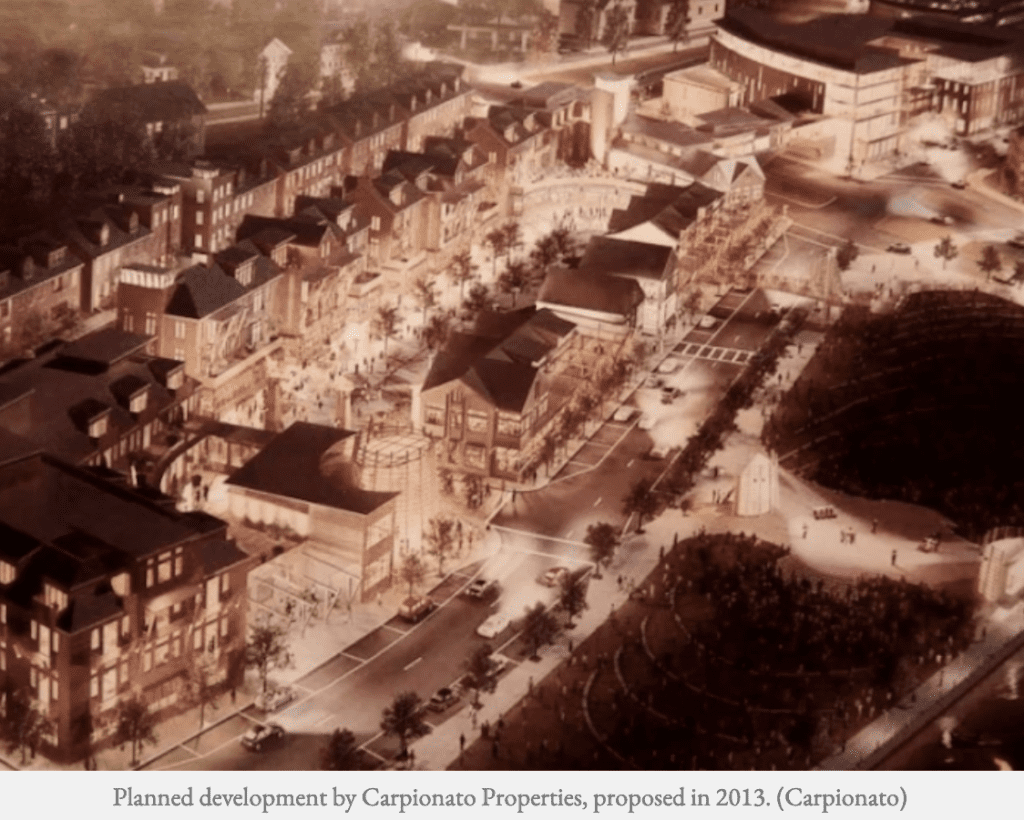
I feel sorry for people who have recently moved into the Benefit Street neighborhood. Perhaps they thought that this city, whose past is so clearly a model upon which to build its future, might adopt development policies that would protect and extend its built heritage. Not to mention residents with even longer tenure in the neighborhood. How could they imagine, after the excellent River Relocation Project of 1990-1996 that created a new, beautiful, traditional downtown waterfront, that the city would instead imitate most American cities, knuckling under to the profane demand, among “professionals,” for architecture that rejects the past and condemns us all to a purposely ugly future.
As the only architecture critic in Providence, and one of the few (if any) around the nation, who tries to follow and review vital projects through their stages of development from a classical design viewpoint, I share blame – for not nagging and blasting the city’s various design commissions (the so-called “experts”) with sufficiently harrowing curses.
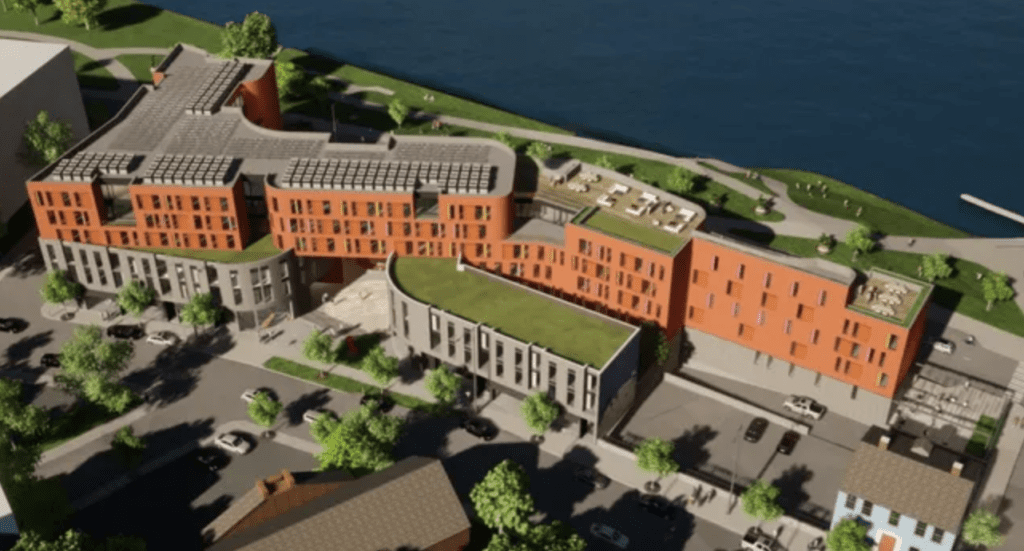
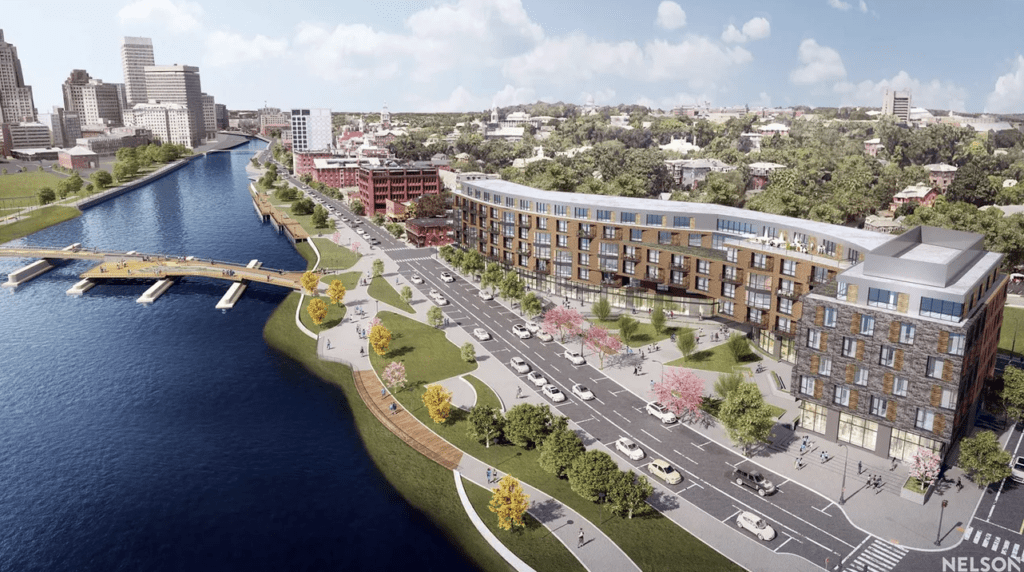
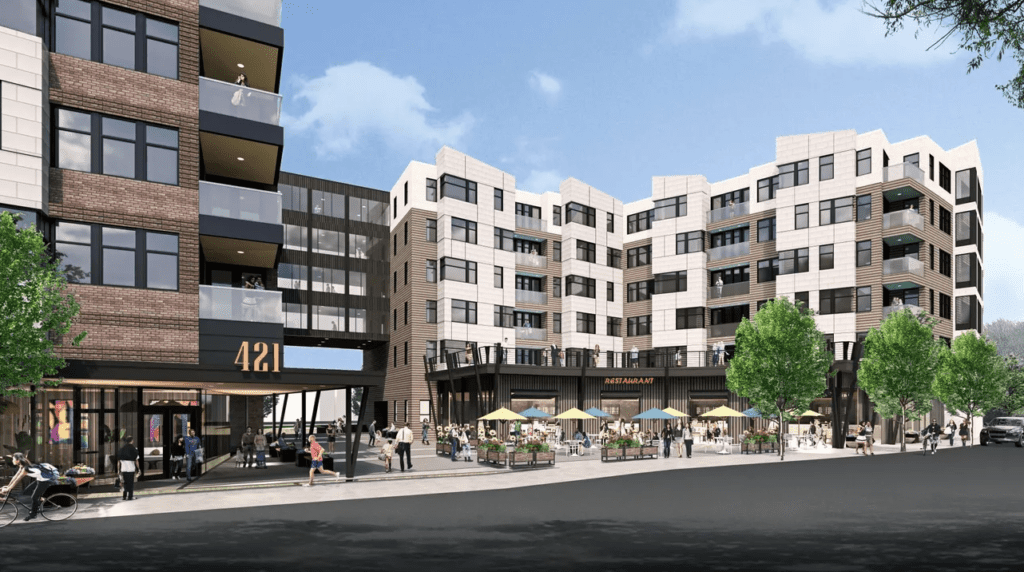
To read Brussat’s blog go to:
_____
To read other articles by David Brussat: https://rinewstoday.com/david-brussat-contributing-writer/

My freelance writing and editing on architecture and others addresses issues of design and culture locally and globally. I am a member of the board of the New England chapter of the Institute of Classical Architecture & Art, which bestowed an Arthur Ross Award on me in 2002. I work from Providence, R.I., where I live with my wife Victoria, my son Billy and our cat Gato. If you would like to employ my writing and editing to improve your work, please email me at my consultancy, dbrussat@gmail.com, or call (401) 351-0457

Hi David,
I completely agree with your point of view. I moved to Providence in 2004 from the Seattle area where I’d lived from 1981-2004 and watched the horror of unrestrained development of that area. My son still lives there, and Seattle is now a big mess of high rise with no charm or personality, and no view of the sound from anywhere near downtown anymore. I’ve been involved in sustainable building for over 40 years and do architectural glass work. My ad is in RI News today, if you click you should be able to see my website, but my real concern isn’t whether I get work, it’s what will happen to Providence as a result of the intense urbanization that is sure to come. We will get bought out by New Yorkers looking for safe space out of the city, and when the Chinese start buying up homes here deep doo doo will ensue. Vancouver BC has finally called a halt to that development, but Seattle has yet to stop it. Money talks, and money ruins cities for live ability in the U.S. Glad you exist, I haven’t seen much commentary from my limited news sources about this. I did a build out to move my studio from Pawtucket to my residential property near P.C. Seven-ten years ago and the zoning board rules and incapacity were stunning, and prolonged the process for over three years which tanked my business and my nervous system. My background is historical archaeology of New England, so I have some background on southern New England since I did my fieldwork with Ted Dethlefson and Jim Dietz through Brown and Franklin Pierce College (not university in the 70’s). At the moment I am overwhelmed with medical treatment, but come summer I would be willing and able to get involved with you and your work saving the city from high rise over development. I am particularly interested in working to change the zoning laws to allow inventive sustainable architecture that is off the grid in RI. Thanks for listening! Best in the icy weekend, stay safe! Deborah
Many thanks for your comment, Deborah. Providence certainly has allowed overbuilding, not just of late but for some half a century. The city avoided most urban renewal and so retained much historical fabric, the value of which to this day its leaders are completely ignorant. I’m sure that through your work you are well aware of this, although I’m a little skeptical that “inventive sustainable architecture” is the answer. We do not need a “third way,” or what most people would consider “inventive.” We need to move into the future by “copying the past” – respecting our heritage. That is a policy that our most “up to date” architects and planners don’t want anything to do with, but they are wrong, at least here in Providence (and in most places). And yet they know of nothing else. But please do keep in touch.